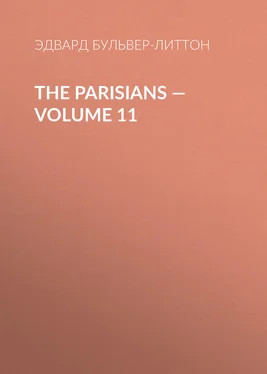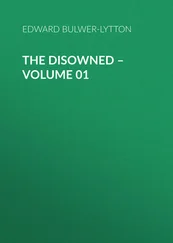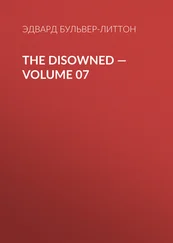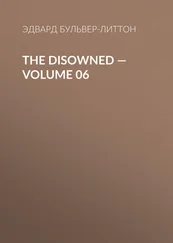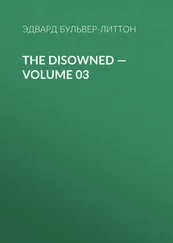Эдвард Бульвер-Литтон - The Parisians — Volume 11
Здесь есть возможность читать онлайн «Эдвард Бульвер-Литтон - The Parisians — Volume 11» — ознакомительный отрывок электронной книги совершенно бесплатно, а после прочтения отрывка купить полную версию. В некоторых случаях можно слушать аудио, скачать через торрент в формате fb2 и присутствует краткое содержание. Жанр: foreign_prose, literature_19, Европейская старинная литература, foreign_antique, на английском языке. Описание произведения, (предисловие) а так же отзывы посетителей доступны на портале библиотеки ЛибКат.
- Название:The Parisians — Volume 11
- Автор:
- Жанр:
- Год:неизвестен
- ISBN:нет данных
- Рейтинг книги:4 / 5. Голосов: 1
-
Избранное:Добавить в избранное
- Отзывы:
-
Ваша оценка:
- 80
- 1
- 2
- 3
- 4
- 5
The Parisians — Volume 11: краткое содержание, описание и аннотация
Предлагаем к чтению аннотацию, описание, краткое содержание или предисловие (зависит от того, что написал сам автор книги «The Parisians — Volume 11»). Если вы не нашли необходимую информацию о книге — напишите в комментариях, мы постараемся отыскать её.
The Parisians — Volume 11 — читать онлайн ознакомительный отрывок
Ниже представлен текст книги, разбитый по страницам. Система сохранения места последней прочитанной страницы, позволяет с удобством читать онлайн бесплатно книгу «The Parisians — Volume 11», без необходимости каждый раз заново искать на чём Вы остановились. Поставьте закладку, и сможете в любой момент перейти на страницу, на которой закончили чтение.
Интервал:
Закладка:
At length the fellow-traveller said in very good English, though with French accent, "Would you object, sir, to my lighting my little carriage- lantern? I am in the habit of reading in the night train, and the wretched lamp they give us does not permit that. But if you wish to sleep, and my lantern would prevent you doing so, consider my request unasked."
"You are most courteous, sir. Pray light your lantern—that will not interfere with my sleep."
As Graham thus answered, far away from the place and the moment as his thoughts were, it yet faintly struck him that he had heard that voice before.
The man produced a small lantern, which he attached to the window-sill, and drew forth from a small leathern bag sundry newspapers and pamphlets. Graham flung himself back, and in a minute or so again came his sigh.
"Allow me to offer you those evening journals—you may not have had time to read them before starting," said the fellow-traveller, leaning forward, and extending the newspapers with one hand, while with the other he lifted his lantern. Graham turned, and the faces of the two men were close to each other—Graham with his travelling-cap drawn over his brows, the other with head uncovered.
"Monsieur Lebeau!"
"Bon soir, Mr. Lamb!"
Again silence for a moment or so. Monsieur Lebeau then broke it—
"I think, Mr. Lamb, that in better society than that of the Faubourg Montmartre you are known under another name." Graham had no heart then for the stage-play of a part, and answered, with quiet haughtiness, "Possibly—and what name?"
"Graham Vane. And, sir," continued Lebeau, with a haughtiness equally quiet, but somewhat more menacing, "since we two gentlemen find ourselves thus close, do I ask too much if I inquire why you condescend to seek my acquaintance in disguise?"
"Monsieur le Vicomte de Mauleon, when you talk of disguise, is it too much to inquire why my acquaintance was accepted by Monsieur Lebeau?"
"Ha! Then you confess that it was Victor de Mauleon whom you sought when you first visited the cafe Jean Jacques?"
"Frankly I confess it."
Monsieur Lebeau drew himself back, and seemed to reflect.
"I see! Solely for the purpose of learning whether Victor de Mauleon could give you any information about Louise Duval. Is it so?"
"Monsieur le Vicomte, you say truly."
Again M. Lebeau paused as if in reflection; and Graham, in that state of mind when a man who may most despise and detest the practice of duelling, may yet feel a thrill of delight if some homicide would be good enough to put him out of his misery, flung aside his cap, lifted his broad frank forehead, and stamped his foot impatiently as if to provoke a quarrel.
M. Lebeau lowered his spectacles, and, with those calm, keen, searching eyes of his, gazed at the Englishman.
"It strikes me," he said, with a smile, the fascination of which not even those faded whiskers could disguise—"it strikes me that there are two ways in which gentlemen such as you and I are can converse: firstly, with reservation and guard against each other; secondly, with perfect openness. Perhaps of the two I have more need of reservation and wary guard against any stranger than you have. Allow me to propose the alternative—perfect openness. What say you?" and he extended his hand.
"Perfect openness," answered Graham, softened into sudden liking for this once terrible swordsman, and shaking, as an Englishman shakes, the hand held out to him in peace by the man from whom he had anticipated quarrel.
"Permit me now, before you address any questions to me, to put one to you. How did you learn that Victor de Mauleon was identical with Jean Lebeau?"
"I heard that from an agent of the police."
"Ah!"
"Whom I consulted as to the means of ascertaining whether Louise Duval was alive,—if so, where she could be found."
"I thank you very much for your information. I had no notion that the police of Paris had divined the original alias of poor Monsieur Lebeau, though something occurred at Lyons which made me suspect it. Strange that the Government, knowing through the police that Victor de Mauleon, a writer they had no reason to favour, had been in so humble a position, should never, even in their official journals, have thought it prudent to say so! But, now I think of it, what if they had? They could prove nothing against Jean Lebeau. They could but say, 'Jean Lebeau is suspected to be too warm a lover of liberty, too earnest a friend of the people, and Jean Lebeau is the editor of La Sens Commun.' Why, that assertion would have made Victor de Mauleon the hero of the Reds, the last thing a prudent Government could desire. I thank you cordially for your frank reply. Now, what question would you put to me?"
"In one word, all you can tell me about Louise Duval."
"You shall have it. I had heard vaguely in my young days that a half- sister of mine by my father's first marriage with Mademoiselle de Beauvilliers had—when in advanced middle life he married a second time —conceived a dislike for her mother-in-law, and, being of age, with an independent fortune of her own, had quitted the house, taken up her residence with an elderly female relative, and there had contracted a marriage with a man who gave her lessons in drawing. After that marriage, which my father in vain tried to prevent, my sister was renounced by her family. That was all I knew till, after I came into my inheritance by the death of both my parents, I learned from my father's confidential lawyer that the drawing-master, M. Duval, had soon dissipated his wife's fortune, become a widower with one child—a girl— and fallen into great distress. He came to my father, begging for pecuniary aid. My father, though by no means rich, consented to allow him a yearly pension, on condition that he never revealed to his child her connection with our family. The man agreed to the condition, and called at my father's lawyer quarterly for his annuity. But the lawyer informed me that this deduction from my income had ceased, that M. Duval had not for a year called or sent for the sum due to him, and that he must therefore be dead. One day my valet informed me that a young lady wished to see me—in those days young ladies very often called on me. I desired her to be shown in. There entered a young creature, almost of my own age, who, to my amazement saluted me as uncle. This was the child of my half-sister. Her father had been dead several months, fulfilling very faithfully the condition on which he had held his pension, and the girl never dreaming of the claims that, if wise, poor child, she ought not to have cared for, viz.,—to that obsolete useless pauper birthright, a branch on the family tree of a French noble. But in pinch of circumstance, and from female curiosity, hunting among the papers her father had left for some clue to the reasons for the pension he had received, she found letters from her mother, letters from my father, which indisputably proved that she was grandchild to the fue Vicomte de Mauleon, and niece to myself. Her story as told to me was very pitiable. Conceiving herself to be nothing higher in birth than daughter to this drawing-master, at his death, poor, penniless orphan that she was, she had accepted the hand of an English student of medicine whom she did not care for. Miserable with this man, on finding by the documents I refer to that she was my niece, she came to me for comfort and counsel. What counsel could I or any man give to her but to make the best of what had happened, and live with her husband? But then she started another question. It seems that she had been talking with some one, I think her landlady, or some other woman with whom she had made acquaintance—was she legally married to this man? Had he not entrapped her ignorance into a false marriage? This became a grave question, and I sent at once to my lawyer. On hearing the circumstances, he at once declared that the marriage was not legal according to the laws of France. But, doubtless, her English soi-disant husband was not cognisant of the French law, and a legal marriage could, with his assent, be at once solemnised. Monsieur Vane, I cannot find words to convey to you the joy that poor girl showed in her face and in her words when she learned that she was not bound to pass her life with that man as his wife. It was in vain to talk and reason with her. Then arose the other question, scarcely less important. True, the marriage was not legal, but would it not be better on all accounts to take steps to have it formally annulled, thus freeing her from the harassment of any claim the Englishman might advance, and enabling her to establish the facts in a right position, not injurious to her honour in the eyes of any future suitor to her hand? She would not hear of such a proposal. She declared that she could not bring to the family she pined to re-enter the scandal of disgrace. To allow that she had made such a misalliance would be bad enough in itself; but to proclaim to the world that, though nominally the wife, she had in fact been only the mistress of this medical student—she would rather throw herself into the Seine. All she desired was to fund some refuge, some hiding-place for a time, whence she could write to the man informing him that he had no lawful hold on her. Doubtless he would not seek then to molest her. He would return to his own country, and be effaced from her life. And then, her story unknown, she might form a more suitable alliance. Fiery young creature though she was—true De Mauleon in being so fiery—she interested me strongly. I should say that she was wonderfully handsome; and though imperfectly educated, and brought up in circumstances so lowly, there was nothing common about her—a certain je ne sais quoi of stateliness and race. At all events she did with me what she wished. I agreed to aid her desire of a refuge and hiding- place. Of course I could not lodge her in my own apartment, but I induced a female relation of her mother's, an old lady living at Versailles, to receive her, stating her birth, but of course concealing her illegal marriage.
Читать дальшеИнтервал:
Закладка:
Похожие книги на «The Parisians — Volume 11»
Представляем Вашему вниманию похожие книги на «The Parisians — Volume 11» списком для выбора. Мы отобрали схожую по названию и смыслу литературу в надежде предоставить читателям больше вариантов отыскать новые, интересные, ещё непрочитанные произведения.
Обсуждение, отзывы о книге «The Parisians — Volume 11» и просто собственные мнения читателей. Оставьте ваши комментарии, напишите, что Вы думаете о произведении, его смысле или главных героях. Укажите что конкретно понравилось, а что нет, и почему Вы так считаете.
